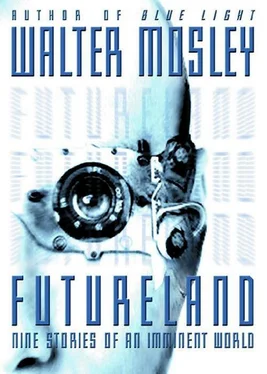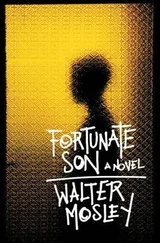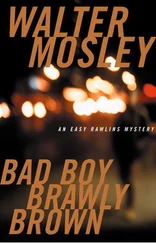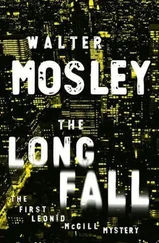“You claim to own people?”
“Not own, collect. We are very civilized about it. We supply a domicile and a stipend, all stipulated in a mutually agreed upon contract. They are free to travel and seek profit through personal endeavors. All I ask is to be able to request their labor at various times.”
“And what does that have to do with me?”
“I want you in my collection, M Akwande.”
“Me?”
“Don’t be modest. You were a great coup for the Sixth Radical Congress. Without you they would have spiraled into anarchic disaster. It was you who redefined their political agenda. This after an impressive career in archaeology. And, if I am not wrong, you were ranked twelfth in the world as a Go master at the age of twenty-one.”
“You are well informed, Doctor. But why settle for twelfth when you could seek out the prime Go master?”
“Ton Li. He lives on the island, of course,” Kismet said, waving a spurious hand. “Boring fellow, really. He knows little beyond strategy. And precious little of that outside the confines of his illegal ivory board.”
Ton Li had defeated Akwande in just six hours of play.
“I am not for sale,” Akwande said.
“What if I told you that the scientists in the Blue Zone had discovered a certain combination of oils, rendered from three distinct legumes, which replicate, almost exactly from a combustion standpoint, the attributes of petroleum?”
“I would buy your stocks for RadCon and forget my quest for financial support.”
Kismet smiled again. “If only I were going public. But alas, dear M, MacroCode has evolved past the primitive whims of the stock market. Our roots are deeper than any econsystem.”
“Then,” Akwande postulated, “I have no interest in your magic beans.”
This response brought laughter to the would-be Tsar’s lips. Never in any vidclip, photograph, or written report had Akwande seen anything intimating that the madman was capable of laughter.
“You see?” Kismet said. “Your appreciation resonates with mine. You surprise me with your acuity and challenge me with your observations. And you understand people. Why spend all your time on the plight of those most of whom do not even know that you exist? Help me to organize off-planet colonization. Make a difference in history.”
The offer filtered past the radical leader’s resolve. Unbidden, the notion of power came to him. Rather than fight for ideals he could create millions of real jobs with the flash of an eyescan. Akwande never felt at home among the fanatics and madmen of the Radical Congress. He did not enjoy a research of conspiracies and the poverty pressed upon him. He wanted a comfortable life for his wife and children, good schools and a woody lane. But his desires could not eclipse the fact that the Malians died, and others too, by the thousands each day.
“I haven’t seen your famous tennis courts, Doctor.”
“What?”
“Your tennis courts. The DataTimes says that you still play from time to time, between national buyouts.”
“Do you understand what I’m offering you?” It was more a threat than a question. “I’m willing to run my faux-petrol project out of any nation you elect. I haven’t paid that much for even an American president.”
“I understand you, Doctor. The problem is that you don’t understand me.”
The monocle flashed on and stayed that way for ten seconds or more. M Akwande was pleased to think how many resources he was tying up. He imagined that somewhere in the mysterious Blue Zone, databases of language and slang were studying his question about tennis courts. Maybe specialists were being consulted. His own personal history was being scrutinized.
Finally, “Do you play tennis?” Kismet asked.
“As a young man I did. I was very impressed with the Williams sisters and how they stormed the tennis world.”
“As was I. But I was more interested in their father. There was a man of vision. He created champions. Creation comes before all else.”
“I wasn’t very good at it,” Akwande continued. “Tennis, that is.” He was thinking about the nine months of training that began a week after he left Ptolemy’s cell. Six hours a day of play, another three of special exercises, and endless hours of concentration meditations. Specialized strength-enhancing and flexibility-increasing injections, electronic acupuncture treatments — all paid for in cash or in kind. There were no electronic trails, no one knew who didn’t need to. Even Aja was unaware of his scheme. The only evidence was a trace of body-enhancing chemicals in his bloodstream. And to cover even that, all of the leaders of RadCon6 had entered a quasi-secret training program where body enhancing drugs were requisite. They were preparing for another period of violence, it was leaked, and the leaders were expected to fight side by side with the rank and file.
“Yes,” Kismet said. “You played when you went to Howard. Not a bad record, really. You could have gone pro.”
“I couldn’t sell you my freedom, Doctor. Such a betrayal by any RadCon leader would set us back a century or more.”
Kismet did not answer. Maybe this silence was meant as some kind of threat, Akwande wasn’t sure. But he decided to act as if it were.
“But maybe we could make a wager,” the radical leader offered.
The ruler’s one eye searched for the trick. “A wager?”
He’s a half-assed gambler, XX Y, co-chair of the Sixth Radical Congress, had said. He’s always entering into contests of skill and knowledge but never games of chance. He’ll bet a billion dollars against a blow job. One time he poisoned a dude and then bet him the antidote in a contest of memory.
Who won? Akwande asked. He was breathing hard after an hour of returning serves from a state-of-the-art servo-master.
Guy fell on his knees and begged Kismet to ask what he wanted. The MacroCode/Infotel merger was signed that day.
“A bet,” Akwande said.
“What kind of bet?”
“The bean farms set up in Mali against my servitude on this plantation.” Before he had come there Akwande was unaware of the petroleum substitute. But he had known that there would be some way that the CEO of MacroCode could save the starving millions of Mali.
“Go?” Kismet suggested.
“No. Ton Li defeated me once. Maybe he’s given you lessons.”
“How about a contest of knowledge about the topic of your choice?”
Akwande appeared to hesitate.
“African-American history, shall we say?” Kismet teased. “You did teach that subject for a while, I understand.”
A moment’s more hesitation, then, “No. I’d better not. My people tell me that you have the second highest IQ in the history of such things. Anything that has to do with the intellect might give you an unfair advantage.”
Kismet’s frown came at the claim of his second place standing.
“Intelligence is highly overrated,” the leader cooed. “How old are you, Doctor?”
“Forty-nine last Thursday.”
“I’m thirty-nine,” Akwande said. “That gives me a physical advantage, theoretically.”
“You want to fight for your freedom?” The humor in Kismet’s voice was chilling.
“In a way. I was thinking of tennis.”
There didn’t seem to be walls in the room they’d brought him to. It was called the Serengeti room. A woven grass mat was laid on real soil among plants that grew naturally. The sounds of wildlife, Akwande assumed, were recordings or computer generated. But the air — it was real savannah air. How could he create that? Akwande wondered if there was some kind of machine that excited past memories, brought them forward by the use of familiar surroundings.
Читать дальше












